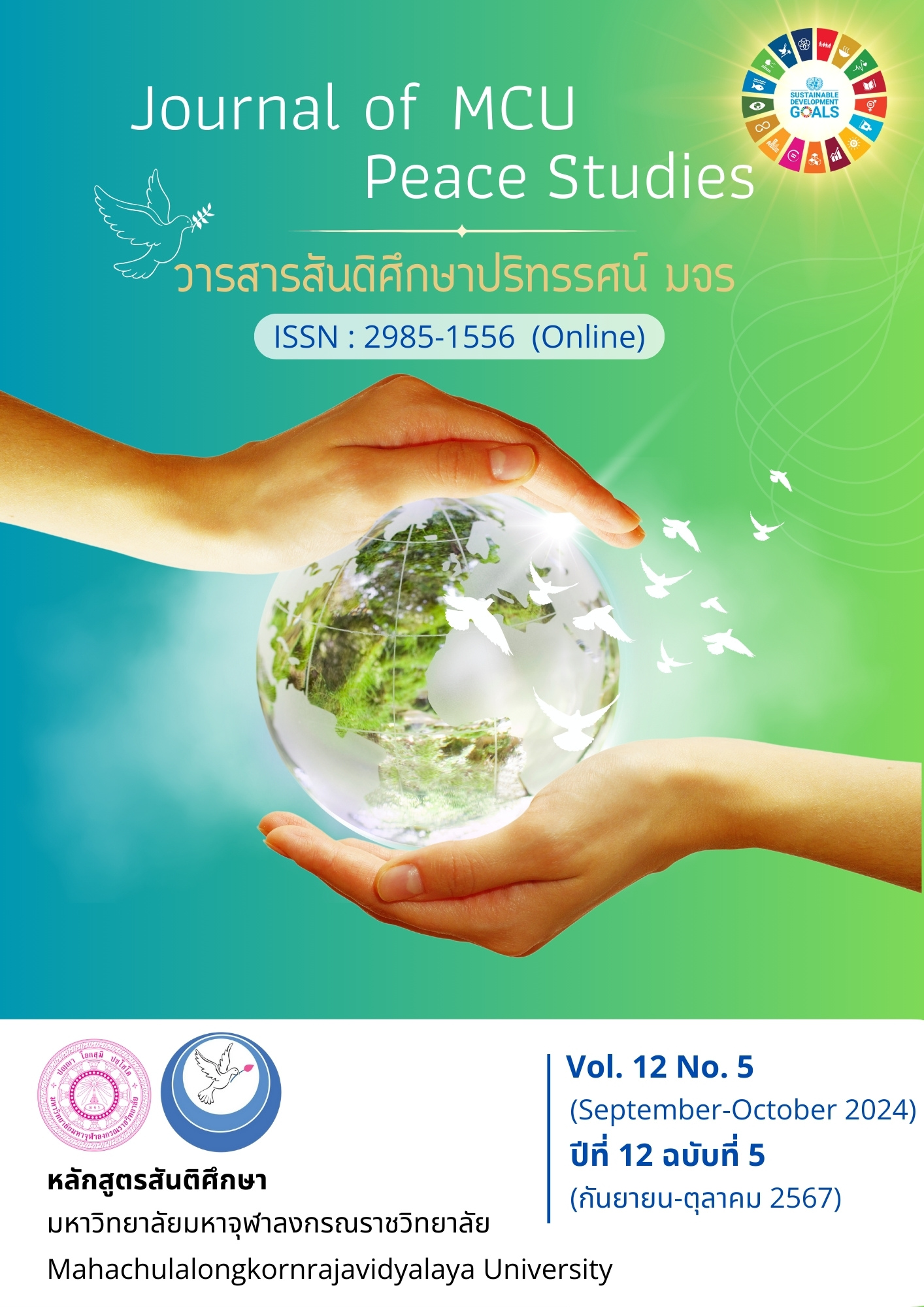การสื่อสารผ่านอัตลักษณ์กับการคงอยู่ของชาติพันธุ์ตามแนวชายแดนจังหวัดราชบุรี
Main Article Content
บทคัดย่อ
การวิจัยครั้งนี้มีวัตถุประสงค์เพื่อ 1) ศึกษาบริบทและแนวทางการสื่อสารของชาติพันธุ์ตามแนวชายแดน 2) ศึกษาอัตลักษณ์กับการคงอยู่ของชาติพันธุ์ตามแนวชายแดน และ 3) ส่งเสริมกระบวนการมีส่วนร่วมของชุมชนในการจัดการสื่อสารผ่านอัตลักษณ์ที่เสริมสร้างการธำรงทางวัฒนธรรมสู่การกำหนดแนวทางส่งเสริมการท่องเที่ยวชุมชนตามแนวชายแดนจังหวัดราชบุรี เป็นการวิจัยแบบผสานวิธี ทำการวิเคราะห์ข้อมูลโดยใช้ค่าความถี่ และค่าร้อยละ การวิเคราะห์เนื้อหา ใช้ค่าเฉลี่ย และส่วนเบี่ยงเบนมาตรฐาน
ผลการวิจัยพบว่า 1) บริบทชุมชนส่งผลต่อแนวทางการสื่อสารของกลุ่มชาติพันธุ์ตามแนวชายแดนเพราะในอดีตกลุ่มชาติพันธุ์ มีการนับถือผีและพลังของธรรมชาติ แม้จะมีการเผยแพร่ศาสนาเข้ามาในชุมชน ผีก็ยังคงมีบทบาทสำคัญต่อการดำเนินชีวิตและความเป็นอยู่ของกลุ่มมาจนถึงปัจจุบัน 2) อัตลักษณ์ที่เกี่ยวกับเรื่องเล่าและวิถีชีวิตส่งผลต่อการคงอยู่ของกลุ่มชาติพันธุ์ตามแนวชายแดน โดยมีการแสดงออกใน 4 กลุ่ม คือ อัตลักษณ์ที่รู้จักกันทั่วไป อัตลักษณ์ที่ปัจจุบันได้เลือนหายไปแล้ว อัตลักษณ์ที่ต้องอาศัยวาระหรือโอกาสพิเศษ และอัตลักษณ์ที่มีการปรับประยุกต์ใช้ในชีวิตประจำวัน โดยนักท่องเที่ยวมีการรับรู้อัตลักษณ์ผ่านสถานที่ท่องเที่ยว วัฒนธรรม และประเพณี กิจกรรมทางการท่องเที่ยว และผลิตภัณฑ์ท้องถิ่น ตามลำดับ และ 3) การคงอยู่ของกลุ่มชาติพันธุ์ต้องอาศัยกระบวนการมีส่วนร่วมระหว่างกลุ่มชาติพันธุ์ด้วยกันเพื่อให้เกิดการผสมกลมกลืนและการยอมรับระหว่างกัน การมีส่วนร่วมกับหน่วยงานภาครัฐ เพื่อให้เกิดการยอมรับ มีอำนาจต่อรองเรียกร้องสิทธิขั้นพื้นฐานต่าง ๆ การมีส่วนร่วมกับสถาบันอุดมศึกษาเพื่อฟื้นฟู เชิดชูภูมิปัญญา การสร้างรายได้จากการใช้ประโยชน์จากทรัพยากรธรรมชาติอย่างสมดุลและยั่งยืน การมีส่วนร่วมกับโรงเรียนเพื่อส่งผลให้เยาวชนมีความสมัครสมานสามัคคี และหวงแหนในความเป็นชาติพันธุ์ของตนเอง และมีส่วนร่วมกับวัดเพื่อส่งผลให้เกิดความผูกพันระหว่างศาสนากับความเชื่อดั้งเดิมเกิดเป็นอัตลักษณ์เฉพาะพื้นที่ นำไปสู่การกำหนดแนวทางส่งเสริมการท่องเที่ยวชุมชนตามแนวชายแดนจังหวัดราชบุรีได้ในอนาคต
Article Details

อนุญาตภายใต้เงื่อนไข Creative Commons Attribution-NonCommercial-NoDerivatives 4.0 International License.
ทัศนะและความคิดเห็นที่ปรากฏในบทความในวารสาร ถือเป็นความรับผิดชอบของผู้เขียนบทความนั้น และไม่ถือเป็นทัศนะและความรับผิดชอบของกองบรรณาธิการ ยินยอมว่าบทความเป็นลิขสิทธิ์ของวารสาร
เอกสารอ้างอิง
Asawarangsikul, N. (2019). Problems of Ethnic Groups in Thailand: Cultural Identity Changing National and International Academic Conferences. Topic: “Big Data and New Face of Asia: Reflection in Science, Arts, Social Science, and Humanities”. Bangkok: Rangsit University.
Bunvayaporn, M., & Chaiyanan, P. (2017). Communication to Maintain Ethnic Identity among Burmese Diasporas in Chiang Mai Province: A Case Study of Burmese Diasporas Residing in Mueang Chiang Mai District of Chiang Mai Province. Journal of Communication and Integrated Media, 5(2), 1-45.
Chaichana, N., & Wongtaw, J. (2018). Food Security in a Cultural Dimension of the Pwo Karen Ethnic Group in Ban Thiphuye, Chalae Sub-District, Thong Phaphum District, Kanchanaburi Province. Asia Social Issues, 11(1), 43-71.
Chanthaprom, N. et al. (2018). The Creativity of Activities for Enhancement the Community Identities in Nanglae Sub-District, Muang District, Chiang Rai. Academic Social Science Journal, 10(3), 127-140.
Charoenratana, S. (2016). The Future of Food Security in the Karen Ethnic Group in Thailand: Community Challenges. Journal of Social Research and Review, 39(1), 147-180.
Charoensuk, A. et al. (2020). Effectively Upgrading the Community Economy: Multilateral Participation in the Area of Photharam District, Ratchaburi Province by Using Cultural Capital. Ratchaburi: Muban Chom Bueng Rajabhat University.
Community Tourism Bureau. (2019). Handbook of Standards for Community-Based Tourist Attraction Management. Bangkok: Special Area Development Administration for Sustainable Tourism.
Dickman, S. (1996). Tourism: An Introductory Text. Sydney: Hodder Education.
Inploy, U., & Saisang, P. (2020). Traditions and Rice Rituals: Relationships between Karens and the Supernatural. Journal of Humanities and Social Sciences University of Phayao, 8(2), 206-228.
Kayanha, A., & Sadakorn, K. (2020). Public Participation Process Development in Thai Society through Political Communication Concept for Community Well-Being Reinforcing. Journal of Humanities and Social Sciences, 4(1), 90-105.
Kongpim, N. (2020). Study of Cultural Identity for Bankhaw Community of Ranot Distract Songkhla Province to Conduct Creative Tourism Route. (Master’s Thesis). Prince of Songkla University. Songkla.
Mamart, A., Leetrakul, S., Anansuchatkul, B., & Treekanukul, L. (2016). The Process of Establishing the Persistence for the Youth of Dara-ang Ethnic Group in Multicultural Society, Chiang Rai Province. Journal of Social Academic, 9(1), 1-12.
Netawong, J., & Sriubon, S. (2022). Report on the Situation of the Republic for the Year 2022. Bangkok: Queen Sirindhorn Anthropology Center (Public Organization).
Plianroong, S. (2021). Ethnic Identity in Cultural Pluralism and Communication. Journal of Journalism, 15(1), 198-228.
Rattaphong, W., Dhammabutra, P., Pooripakdee, S., & Tungbenchasirikul, S. (2019). Approaches for Sustainable Creative Tourism Development in Ratchaburi Province, Thailand. Journal of Management Walailak University, 9(4), 124-138.
Thammawimutti, A., & Siriwong, P. (2017). Thai Song Dam Identity Maintenance: Discursive Practice to Strong Community Building of Hua Kao Jeen Village. Veridian E-Journal, Silpakorn University, 10(1), 1552-1571.


